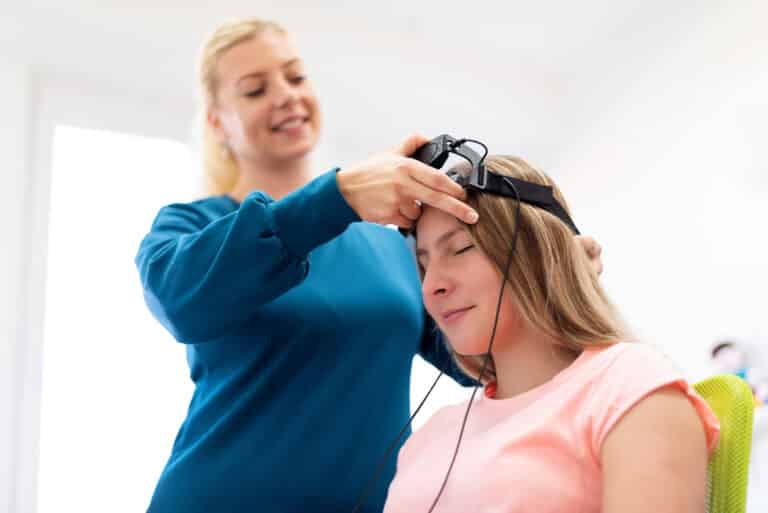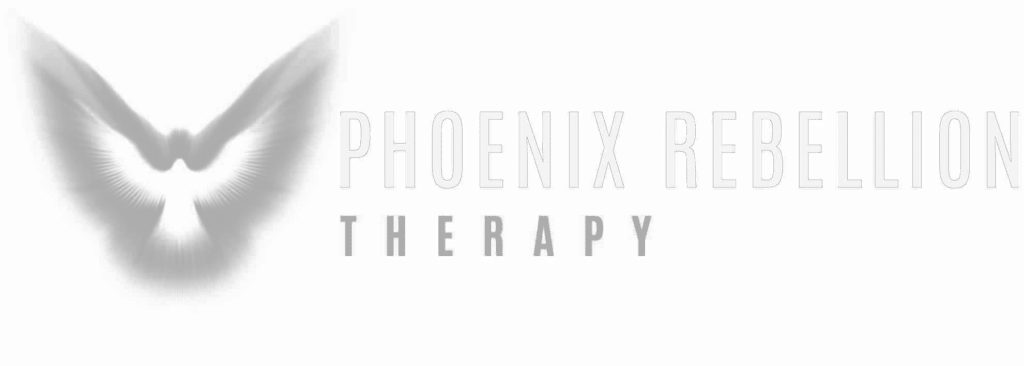Our Treatment Methods
At Phoenix Rebellion Therapy we believe in the power of asking for help. Creating a safe, personalized and confidential experience for the client is paramount. Each client is different and unique and so is the treatment approach co-developed between client and therapist.

Neurofeedback
Neurofeedback (NFB) is a cutting-edge form of treatment, based on over 40 years of research, that involves training the brain to improve its own functioning. NFB is a safe, non-invasive and non-verbal treatment. NFB is not about having clients learn to relax. EEG sensors are used to pick up brain wave activity.

EMDR Therapy
Eye Movement Desensitization and Reprocessing is a form of psychotherapy in which the person being treated is asked to recall distressing images; the therapist then directs the client in one type of bilateral sensory input, such as side-to-side eye movements or hand tapping.

In Person Sessions
Crave direct connection and not used to video chatting with others? In-person counseling might be a good fit. Our personalized in-person therapy can make your treatment feel more significant. Your therapist’s office can become a physical safe space unlike any other in your life.

A.R.T. Therapy (Accelerated Resolution Therapy)
Accelerated Resolution Therapy (ART) is a unique psychotherapeutic approach guided by an ART therapist to replace negative images causing Post-Traumatic Stress symptoms. It integrates eye movement with established therapies like Gestalt, Psychodynamic Therapy, and Guided Imagery, using eye movements to generate Theta waves linked to creativity and intuition.

TeleHealth
TeleHealth is simple. It’s meeting and communicating with your therapist or clinician in real time over your phone, laptop, or tablet. We will be able to see and hear each other just like we would with in-person sessions.
Our Results
Our FAQs
Do I need counseling?
If you feel you have experienced trauma or PTSD, it is important to address these issues and work through them with an experienced professional. We are committed to easing the stresses of everyday life and working with individuals to overcome traumatic events. Please consider counseling if you are:
- Having trouble functioning at home or work
- Suffering from fear, anxiety, or depression
- Unable to form close, satisfying relationships
- Terrifying memories, nightmares, or flashbacks
- Avoiding more and more triggers
- Avoiding things that remind you of the trauma
- Feeling numb and disconnected from others
- Using alcohol or drugs to feel better
How do I cope?
Get moving. Trauma disrupts the natural balance of your body. Your nervous system gets “stuck.” Exercising for at least 30 minutes most days can help put your nerves at rest. Rhythmic exercises involving both your arms and legs are best.
Don’t isolate yourself. Many feel the need to withdraw from others following a traumatic event. Isolation only makes things worse. Connect with others face to face. A network of support will help you heal.
Take care of your health. Along with meditation techniques such as mindful breathing, getting plenty of sleep and eating a well-balanced diet go a long way. Having a healthy body can increase your ability to cope with the effects of trauma.
At Phoenix Rebellion Therapy, we will work with you to develop additional healthy coping skills. Call or contact us online to schedule an appointment.
I tried therapy elsewhere and it didn’t help. What do I do now?
Unfortunately, many individuals have tried talking to a therapist about their trauma for years on end without finding relief. Although many therapists say that they can treat trauma, statistics show otherwise. Researchers have found 60% of current therapists cannot name the top three interventions that should be used to help reduce trauma or PTSD.
Our therapists are highly trained trauma experts. We are committed to easing the stresses induced by trauma and PTSD and helping you lead a bright, beautiful future. We specialize in working with military personnel and veterans, but our techniques are designed to help every individual.
What can I expect in Neurofeedback sessions?
We instruct our clients to not try to do anything beyond attending to the process. NFB is very engaging because the feedback is embedded within your choice of movies, and involves things like a movie expanding and shrinking, or a race car going faster and slower.
EEG sensors are used to pick up your brain wave activity. The brain then observes this activity, and through a method called Associative Learning, improves its own self-regulatory skills. Since self-regulation is a foundational skill of the brain, it naturally improves its own performance based on the feedback it gets from its own activity.
How do I know if Neurofeedback is right for me?
NFB is well suited for those who have a strong history of trauma. It is compassion-informed, non-judgmental, and non-triggering. NFB treatment can be used with any diagnosis.
NFB requires no effort on your part. It can be done with people of any age – but usually 17 years and older. It can also be used as a stand-alone treatment, or as part of a comprehensive treatment plan.
ILF NFB has also been implemented into a vast range of settings including veterans services, community mental health programs, special education services, substance abuse programs, foster care programs, programs for recently released prisoners, programs serving the homeless, drug courts, programs serving battered women, and domestic violence programs.
Schedule an appointment or call and talk to one of our therapists today to find out if Neurofeedback is right for you.

